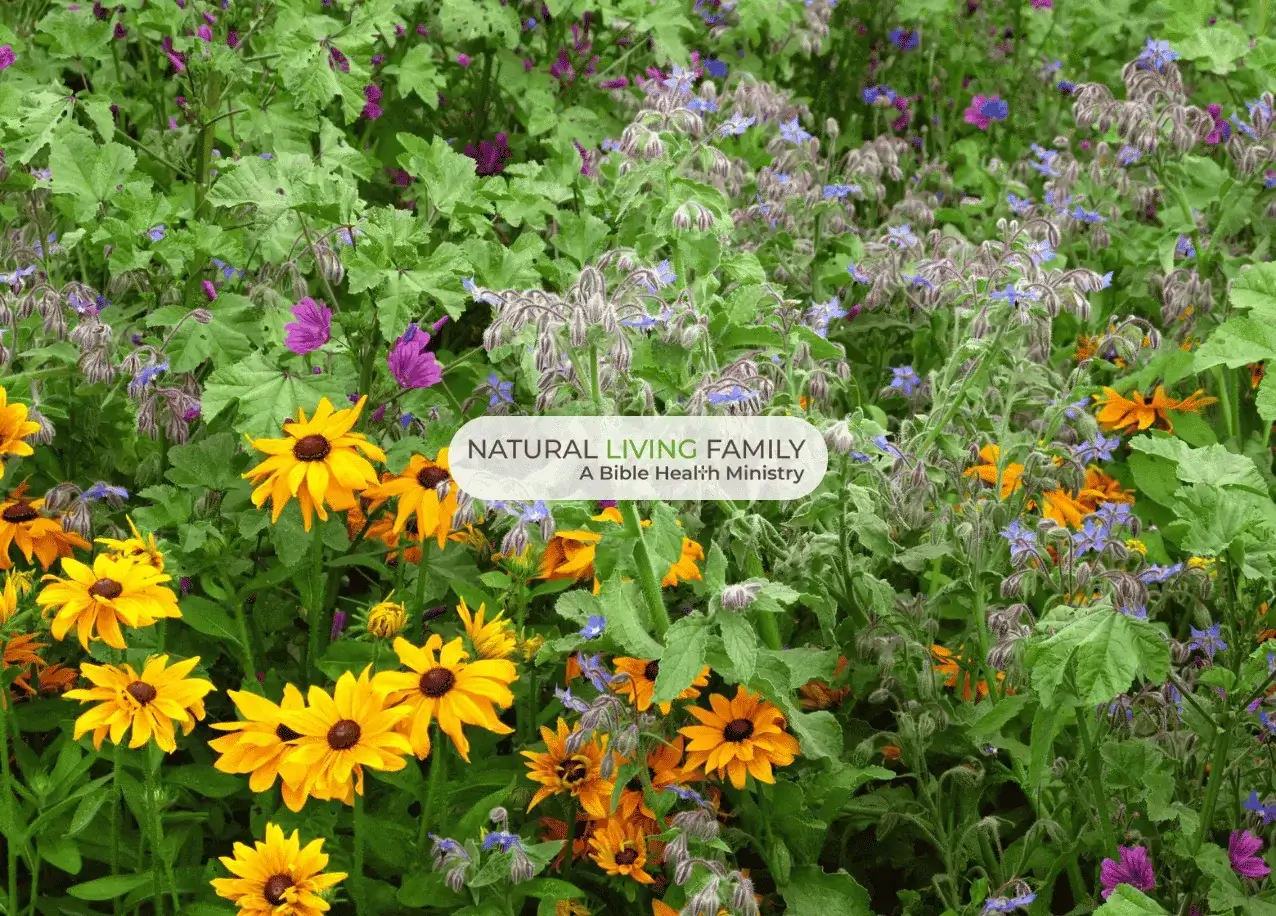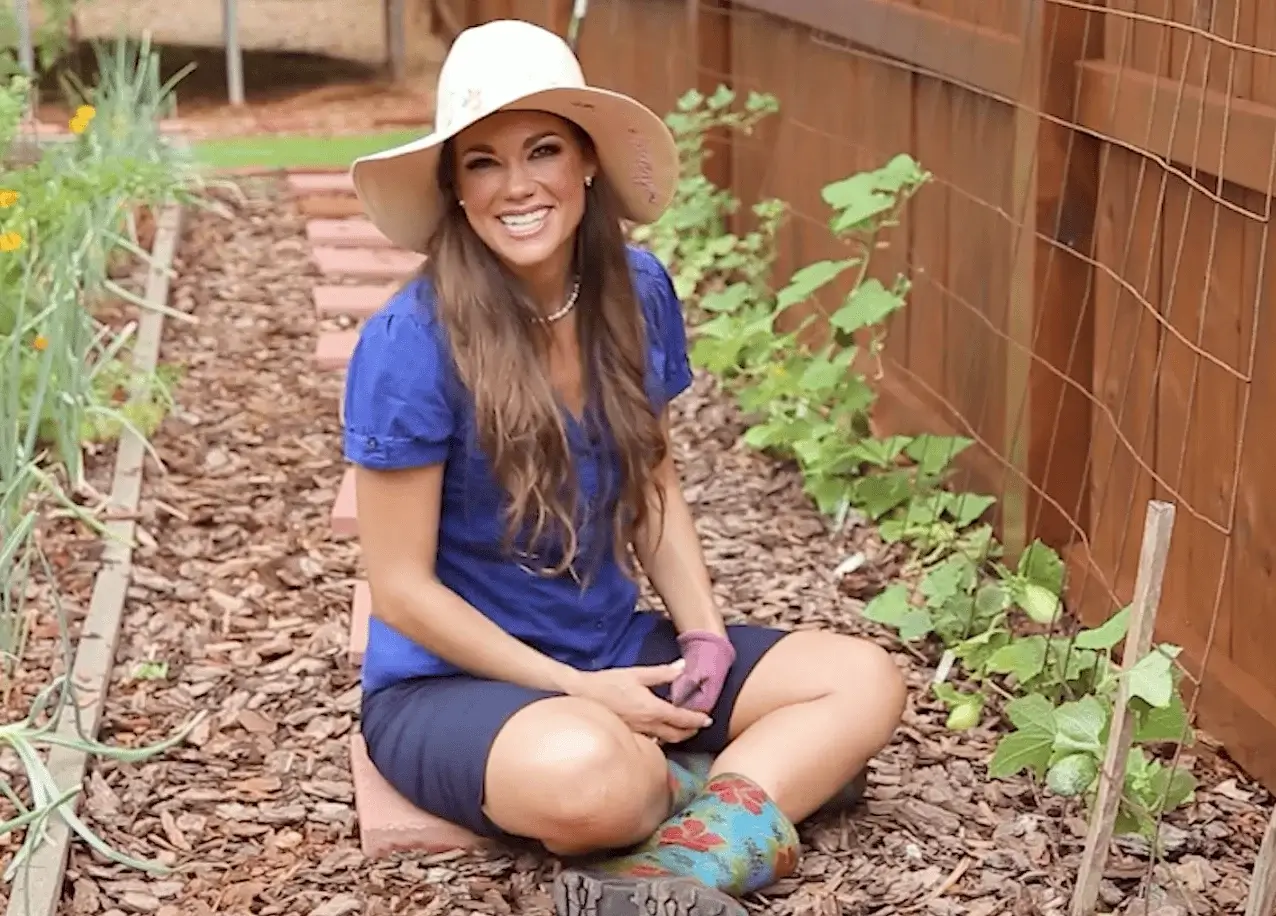This urban homesteading 101 post is a guest contribution from Angela England, our content director and author of Backyard Farming on an Acre (More or Less) and Gardening Like a Ninja guide to edible landscaping. Perhaps it’s only logical then that our Natural Living Family would attract some incredible people who have valued self-sufficiency skills to teach the community, and Angela will introduce you to a mindset of self-sufficiency, frugality, earth-friendliness, and natural wellness. Hope you enjoy!
Table of Contents
What is Homesteading?
I like to think about an urban homestead as a lifestyle of self-sufficiency. And the truth is, you do not have to have acres of land in order to begin growing your own food and doing your own household DIYs. Even city dwellers can do a lot for your family on your own, even in just small outdoor spaces whether it’s raising a couple of backyard chickens or growing seasonal vegetable gardens.
In my book, Backyard Farming on an Acre (More or Less) I share, “I’ve found that I’m able to enjoy many of the benefits of small-scale farming right in my own backyard—even in a small town. Being a small-scale farmer has huge advantages for those who only work their farm on a part-time basis.
Starting small is also a benefit for those who are testing the waters to see what level of this lifestyle they want to adopt. Our family has been slowly adding new elements to our backyard farm each year to see what steps we are comfortable with.”
When you look at what Mama Z has done in her own organic, backyard garden you’ll see how much she’s able to produce in even small spaces. Food production doesn’t have to be limited to large farms when you embrace the homesteading lifestyle. Not to mention the health benefits of growing your own organic food like herbs, vegetables, and more.
Urban Homesteading Mindset Principles
Because that suburban homesteader mindset doesn’t have to be just about gardening you aren’t even limited to exercising your green thumb. Homesteading practices include things like:
Using Earth-Friendly Principles – Striving to be a good steward of the earth is a common homesteading principle and something God calls us to.
Learn Methods of Food Preservation – This includes canning, dehydrating, and freezing food while it is available to store for a later time.
Self-Sufficiency – Making things for yourself helps you ensure quality, control costs, and prevent outages during emergencies. This aspect of homesteading life can be done by anyone, no matter where you live!
Frugal Living – DIYing and saving to purchase wisely all fall under Homesteading 101 financial skills. Urban homesteaders will save money whether you live in an apartment or suburban space.
High-Quality – The homestead mindset means recognizing good quality and striving to get the best whenever possible. Mama Z often says that using the right tool for the job will save you in the long run!
Local or Small Business – There’s a reason we love going to farmer’s markets, harvesting at you-pick farms, or buying homemade items from friends. Urban Homestead 101 means that when you can deal with a producer or teacher directly, you know you’re supporting an actual human and building up your community resources.
The awesome thing about incorporating homesteading 101 principles into your daily life is that you can enjoy many of the benefits of homesteading even without a farm. And you can start right away with our Natural Living Family community!
Benefits of a Homesteading Lifestyle
If there’s one thing we’ve learned during recent uncertainties, it’s that being prepared as a family, and having the skills needed to take care of yourself, can be so important. There are a lot of reasons to consider being prepared as a family, as this article in The New York Times reminded us.
Budgeting. Food preservation skills like dehydrating, freezing, and canning, can help you save money by saving when you have a bountiful harvest or find a good sale and pick up extra produce. Buying on sale to set aside for when things aren’t available or aren’t available inexpensively, is a great way to maximize your grocery budgets.
This is also true when it comes to herbal remedies. Herbal-infused oils, for example, can be as much as $10-20 or more per ounce if you buy them commercially. And you won’t know the quality of the base oil or herbal material that was used. As we’ve seen in the olive oil benefits report, it’s not uncommon for oils to be adulterated.
However, I can make an infused oil with my own homegrown rosemary, a plant I bought four years ago, for pennies on the dollar. I’ll know it was an organically grown herb, and I can choose a high-quality carrier oil suited for my desired purposes. This ensures that I’ll get the best results.
Health. One of the first things you learn as a member of the Natural Living Family is how much healthier it is to make many of your own cleaning products, body care products, and especially meals. When you control the ingredients you can ensure that you eliminate toxic and unhealthy options from your life.
Stability. It’s no surprise to anyone anymore that our supply chain is more global than it used to be. Preparedness on an urban homestead means having some items on hand in case of emergencies and disruptions. It also means knowing certain skills that will allow you to do for yourself.
For example, my husband still uses the homemade hand sanitizer I make him for his retail job. Not only am I able to power it with essential oils, but I never had to worry about running out because I had the ingredients on hand. (Bonus points for the effectiveness too – he was the only member of the management team who didn’t take any sick days last year!)
Quality Control. I speak from experience when I say there’s nothing better than homemade food and herbal preparations. It puts me in control of everything. The freshness of the ingredients, the quality of the blends I choose, and the customization of the formulas for me and my family…from the very beginning. Not only can I grow or buy the best ingredients out there, but then I can assemble them in a way that doesn’t overprocess, destroying bioactive compounds that help to heal and nourish.
Peace of Mind. Do not underestimate how valuable this can be. With five kids I always keep extra on hand, which helps my mental health. When things got crazy I not only had peace of mind for my family, but I was able to bless those around me with a dozen eggs from my backyard chickens here and some freshly harvested herbs there. We didn’t depend on being able to find a specific item at the grocery store on a specific day because I knew I had some items prepared ahead of time. As Mama Z says, “Proper Planning Prevents Poor Performance”. And allows peace of mind too!
Urban Homesteading 101 Tips
Now I realize not everyone lives in the country or has lots of acreage. I grew up in a big city in California so I know the limitations that can come from being in a big city. But one thing I learned researching edible landscaping is that you can easily embrace lots of homesteading skills no matter what size home you live in.
1. Grow a Container Garden
One of the simplest ways to grow a garden in a limited space is by far a container garden. You can use any bit of land, even concrete, like a sunny patio, apartment balcony, or even bright windowsill if needed, and enjoy delicious, green, growing things. The biggest thing to remember with a potted plant is that the root system is smaller than plants in an outdoor garden area, so be mindful to water regularly, as needed.
2. Make a Medicinal Herb Garden
Growing an herb garden is one of the best returns on your time and money on an urban homestead in my opinion. For the price of one tiny stem of fresh basil from the grocery store, you can buy a full packet of seeds that will produce dozens of basil plants – enough for the whole year! Whether you’re growing herbs to infuse carrier oils for your essential oil DIYs, to boost the taste (and health) of your kitchen recipes, or to enjoy homegrown herbal tea, there’s a bounty of fragrance and flavor awaiting you.
3. Begin a Compost Bin
Using compost is a primary technique of regerative gardening. It’s super earth-friendly and repurposes food waste you’d otherwise throw away – all central principles for Homesteading 101! You can keep your compost bin in a self-contained Garden Tower, a yard-tumbler, or even a simple and homemade wire bin-style compost setup. Regardless of what you use to hold your compost, turning your kitchen and garden waste into nutritious, healthy soil is just plain smart.
4. Learn Food Preservation Skills
Saving food during times of plenty, so it’s available during lean times is not only part of a wise emergency plan…it is one of the many homesteading practices you’ll want to adopt. It will save you money too because you preserve food you won’t use right away instead of letting it spoil or be wasted! Canning, freezing, and dehydrating to preserve food for later is a win/win when it comes to Homesteading 101 skills and sustainability practices!
5. Create Kitchen Staples Yourself
Learning how to make your own kitchen staple items may seem like a daunting task, but start small with simple recipes and try trickier things as your skill and confidence levels increase. Try simple herb blends such as a taco seasoning mix. Then graduate to homemade condiments like homemade ketchup or spaghetti sauce. Before you know it you’ll be making your own bread or homemade cheese like Little House on the Prairie!
6. DIY Wellness & Household Products
It’s no secret that many homesteaders become very proficient at DIYing items the average person would run to the grocery store or Amazon to pick up. In fact, the Natural Living Family newsletter often shares DIY remedies and how-tos! Making your own household cleaners and body care products is a great way to improve your homesteading skills.
Please do not think for one moment that being in a suburban space can stop anyone from becoming successful homesteaders. Urban Homesteading 101 means getting creative with your skills and leveling up as you learn and try new things!
What is Homesteader’s Corner?
In fact, this is something we believe in so strongly, that we have an entire class module dedicated to the urban homesteading lifestyle in our Bible Health Academy, called the Homestead Corner.
When you join the Bible Health Academy and unlock the Homestead Corner you’ll see all the videos and lessons and can let us walk you through each step as you recapture these lost arts.
Video class segments in the Homesteader’s Corner include:
- Fermenting Veggies
- Make Homemade Kombucha
- Cheese Making Tutorials
- Homemade Butter & Ghee
- Making Your Own Yogurt
- Freezing Garden Produce
- Canning Tips & Tricks
- Water Bath Canning Recipes
- Preparing Food for Canning
- Herbal Tinctures & Glycerites
- Herbal Vinegar Infusions
- Wellness Preparations & Remedies
- Salve & Balm Making Walkthrough
- Food Drying & Dehydration Techniques
- Milk Bath & Sugar Scrub DIYs
- …and more!
This little corner of the Bible Health Academy helps bridge the gaps between Organic Gardening and the Bible Health information so you are empowered to transform your wellness efforts, your kitchen skills, and your food management to take your health to the next level.
This way of looking at the world doesn’t depend on whether you have a lot of land or live in the country. It’s all about taking control of your health, your food, and more.











